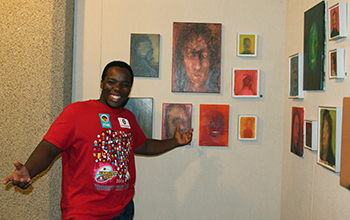Latest News Archive
Please select Category, Year, and then Month to display items
13 August 2024
|
Story Anthony Mthembu
|
Photo Sibahle Dayimani and Amandla Kulu
 Prof Peter Roseel, Managing Director of Management Consulting and Research – a spin-off of the Catholic University of Leuven in Belgium; and Prof Nicolene Barkhuizen, Director of the UFS Business School.
Prof Peter Roseel, Managing Director of Management Consulting and Research – a spin-off of the Catholic University of Leuven in Belgium; and Prof Nicolene Barkhuizen, Director of the UFS Business School.
The Business School at the University of the Free State (UFS) hosted Prof Peter Rosseel, Managing Director of Management Consulting and Research – a spin-off of the Catholic University of Leuven in Belgium – for a guest lecture during his visit to the UFS Faculty of Economic and Management Sciences (EMS).
The guest lecture took place on 19 July 2024 in the Business School Auditorium and was attended by academics from the UFS.
Reflecting on the lecture
The lecture presented by Prof Rosseel focused on how combining strategy, strategy implementation, culture transformation, leadership, and learning successfully leads to sustainable growth, creates engagement, and delivers tangible results. Throughout the lecture, Prof Rosseel spoke about how experts tend to make bad leaders and therefore stop change from happening within an organisation. In fact, he highlighted that, “Experts stop change from happening within the workplace because experts, by definition, look through the eyes of their expertise, but you cannot reduce the world to different forms of expertise, as it is holistic.” As such, he argued that to change an organisation, one must see things from the point of view of others.
Furthermore, Prof Rosseel delved deeper into the hierarchical operating model within organisations. He indicated that the above model should be one community within organisations; however, unfortunately it is not. This is because organisations are made up of several departments such as finance and human resources. As such, he regards these departments to be silos that could prove to be detrimental to organisations, as each silo can create its own culture as opposed to an organisational culture. These are some of the points he discussed throughout the lecture.
After the lecture concluded, the audience had the opportunity to engage with Prof Rosseel on his viewpoints. In fact, Lyle Markham, Academic Head of Department and Lecturer in Industrial Psychology at the UFS, was one of the audience members and described the lecture as insightful.
Pauline Gutter’s metaphorical representations of South Africa
2016-04-07

Art student, Thamsanqa Malgas views the Purgatorium exhibition at the Stegmann Gallery on the Bloemfontein Campus (UFS).
Photo: Rethabile Isaacs
|
Purgatory is a temporary condition of torment or suffering. This is the central thread of the renowned artist’s exhibition, Purgatorium, at the University of the Free State (UFS). Pauline Gutter’s exhibition was opened by Harry Siertsema on 9 March 2016 at the Stegmann Gallery on the Bloemfontein Campus.
The artist, who grew up on a farm in the Free State, is influenced by animals and farm life. “My work is on many levels a metaphorical representation of the violence of current South Africa. Some people want to move away from stigma, others adopt hysteria. The impressive yet vulnerable bulk of the bulls depicted in uncomfortable positions manifests the voiceless and powerless generation of food producers in their daily struggles for survival,” she wrote in the catalogue of the exhibition.
Prof Dirk van den Berg of the UFS Department of History of Art and Image Studies wrote an essay about the exhibition, in which he captures the lived endurance of stress and suffering which Pauline Gutter depicts vividly in Purgatorium.
“The paintings, drawings, and prints in this exhibition have, in various ways, the effect of disseminating the basic tenor of the weaning metaphor of struggle for survival into the farming domains of the land, its creatures, and its people,” said Prof van den Berg.
Art student, Thamsanqa Malgas, was very impressed with the exhibition, saying that it was a fascinating collection, and a must-see for art lovers. The exhibition closed on 1 April 2016.